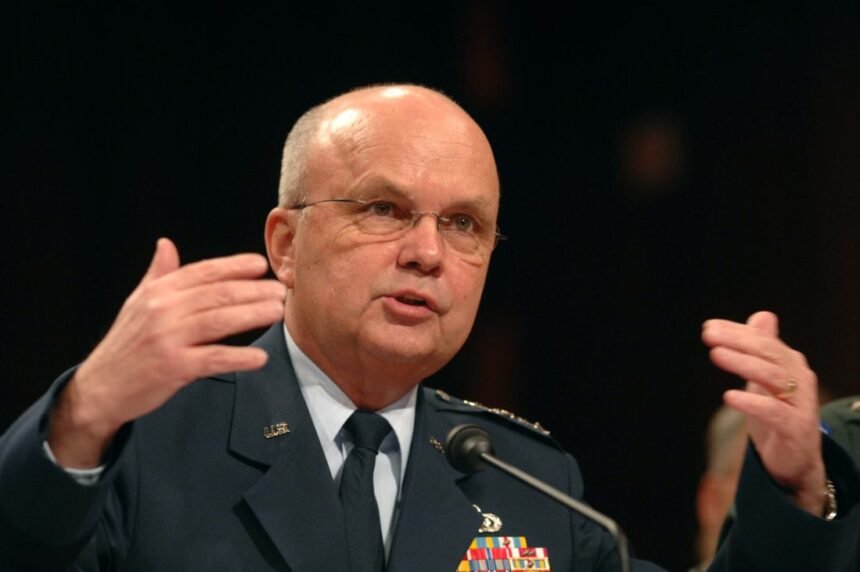Few figures in the American intelligence community have been as influential and, at times, as controversial as General Michael Hayden. His career spanned pivotal moments in U.S. history, from the Cold War’s aftermath to the rise of global terrorism and the digital age. From leading the National Security Agency (NSA) to directing the Central Intelligence Agency (CIA), Hayden played a central role in shaping the landscape of American intelligence. This exploration delves into his career, controversies, and lasting impact on national security.
A Stellar Rise Through the Ranks
Michael Vincent Hayden, born in Pittsburgh, Pennsylvania, embarked on his military career after graduating from Duquesne University. He entered the Air Force as a Second Lieutenant in 1969, quickly rising through the ranks. His early career focused on intelligence, and he demonstrated a keen understanding of signal intelligence (SIGINT) and strategic planning. He commanded at squadron, group, and wing levels, demonstrating leadership capabilities that would eventually propel him to the highest echelons of the intelligence community. Therefore, these early experiences provided him with a deep understanding of the complexities of intelligence gathering and analysis.
From Tactical to Strategic Leadership
Hayden’s career trajectory saw him transitioning from tactical command to strategic leadership roles. He served as the Director of the Joint Command and Control Warfare Center at Kelly Air Force Base, Texas, and later as the Deputy Chief of Staff for Intelligence at the Air Combat Command, Langley Air Force Base, Virginia. These positions exposed him to the challenges of integrating intelligence with military operations. Further, his understanding of technology and its application to intelligence became increasingly important.
Leading the National Security Agency (NSA)
In 1999, Hayden assumed the directorship of the National Security Agency (NSA), a position he held until 2005. This period coincided with a dramatic shift in the global security landscape. The 9/11 terrorist attacks forced the NSA to adapt and expand its capabilities to address the evolving threat.
The Post-9/11 Era and the Terrorist Surveillance Program
The aftermath of 9/11 saw the implementation of the Terrorist Surveillance Program (TSP), a highly classified program that allowed the NSA to monitor the communications of individuals with suspected ties to terrorism without obtaining warrants. This program, authorized by President George W. Bush, became a source of significant controversy.
Critics argued that the TSP violated the Fourth Amendment of the U.S. Constitution, which protects against unreasonable searches and seizures. Supporters, on the other hand, maintained that the program was necessary to prevent future terrorist attacks. This debate continues to resonate within the intelligence community and the public sphere.
According to a Reddit user discussing the TSP, “The debate really boils down to security versus liberty. How much are we willing to give up in terms of privacy to feel safe?” This highlights the core tension that has shaped much of the debate surrounding Hayden’s tenure at the NSA.
General Michael Hayden and the Modernization of the NSA
Beyond the controversy surrounding the TSP, Hayden also oversaw a significant modernization of the NSA’s infrastructure and capabilities. He recognized the importance of adapting to the digital age. As a result, he invested in new technologies and strategies to counter cyber threats and track the activities of terrorist groups online. He understood that the future of intelligence gathering lay in harnessing the power of data and technology.
Directing the Central Intelligence Agency (CIA)
In 2006, Hayden was appointed Director of the Central Intelligence Agency (CIA), succeeding Porter Goss. This appointment placed him at the helm of another key pillar of the U.S. intelligence community. He faced the challenge of managing a sprawling organization with a global reach. Moreover, he had to address ongoing concerns about the effectiveness and ethical conduct of its operations.
Managing a Global Intelligence Network
As Director of the CIA, Hayden was responsible for overseeing a vast network of intelligence officers, analysts, and assets operating around the world. The CIA’s mission encompassed a wide range of activities. These activities included gathering intelligence on foreign governments, conducting covert operations, and combating terrorism.
He emphasized the importance of human intelligence (HUMINT) in complementing technological capabilities. In other words, he understood that understanding the motivations and intentions of adversaries required more than just technical data.
Balancing Security and Oversight
Hayden’s tenure at the CIA was also marked by efforts to balance the need for effective intelligence gathering with the imperative of Congressional oversight and public accountability. He worked to improve the CIA’s relationship with Congress and to address concerns about past abuses. However, he also defended the CIA’s use of controversial interrogation techniques, such as waterboarding, arguing that they had yielded valuable intelligence.
“The intelligence community operates in the shadows, and that requires a level of trust. But trust must be earned, and oversight is essential to ensuring that trust is maintained.” – Anonymous Intelligence Expert
General Michael Hayden: Legacy and Controversy
Hayden’s career has been marked by both significant achievements and considerable controversy. He played a critical role in shaping the U.S. intelligence community’s response to the challenges of the 21st century.
Enduring Impact on Intelligence Policy
General Michael Hayden has left an undeniable mark on U.S. intelligence policy. His leadership at the NSA and CIA coincided with a period of rapid technological change. This called for adapting intelligence gathering methods. He championed the use of technology to combat terrorism and to understand global threats. His emphasis on cybersecurity and data analysis continues to shape the way the intelligence community operates today.
Debates Over Surveillance and Civil Liberties
However, Hayden’s legacy is also intertwined with debates over surveillance and civil liberties. The Terrorist Surveillance Program and other intelligence activities undertaken during his tenure have raised fundamental questions about the balance between security and individual rights. These debates continue to shape the legal and political landscape surrounding intelligence gathering in the United States.
According to another Reddit user, “The real problem is the lack of transparency. We need a more open discussion about the government’s surveillance powers.”
The Evolving Cybersecurity Landscape
He has become a prominent voice on cybersecurity issues in recent years. He has warned of the growing threat posed by state-sponsored hackers and criminal organizations. He has advocated for a more robust national cybersecurity strategy. He has also stressed the importance of public-private partnerships in protecting critical infrastructure. General Michael Hayden’s understanding of the evolving cyber threat landscape has made him a valuable advisor to policymakers and business leaders.
Concluding Thoughts
General Michael Hayden’s career reflects the complex and often conflicting demands placed on the U.S. intelligence community. He was a dedicated public servant who rose to the highest levels of leadership. He faced difficult decisions in the face of unprecedented threats. While his actions have been praised by some as necessary to protect national security, they have also been criticized by others as infringing on civil liberties. Ultimately, his legacy is a subject of ongoing debate and scrutiny. It serves as a reminder of the enduring tension between security and freedom in a democratic society. Furthermore, his contributions to cybersecurity and intelligence modernization ensure that his impact will be felt for years to come.
Stop Wasting Precious Hours: Mastering the Economies of Time to Supercharge Your Life!






